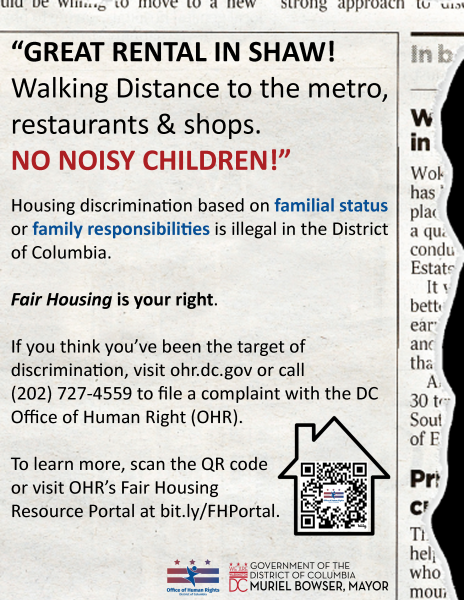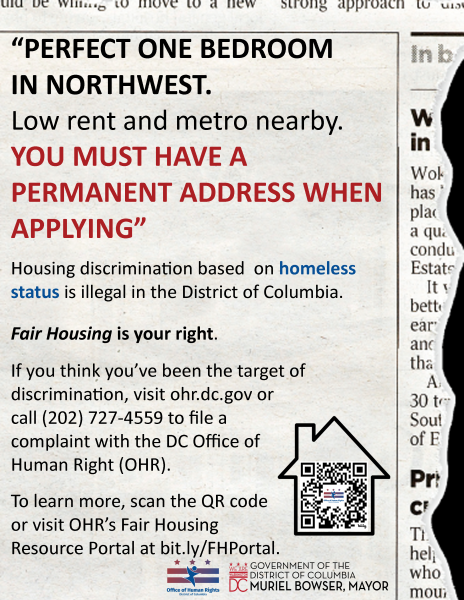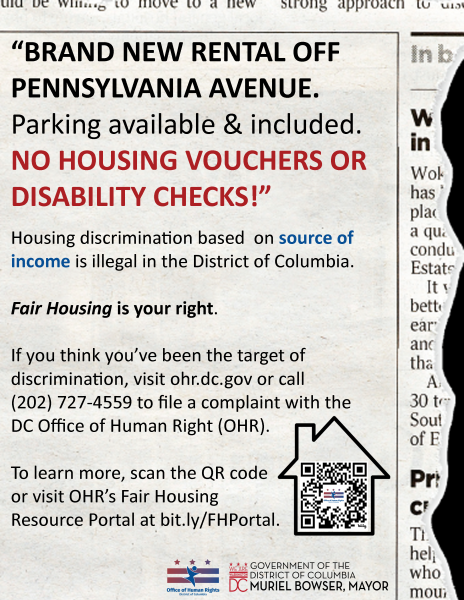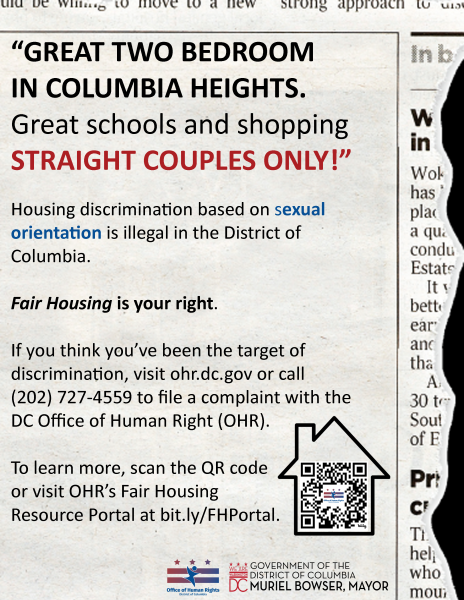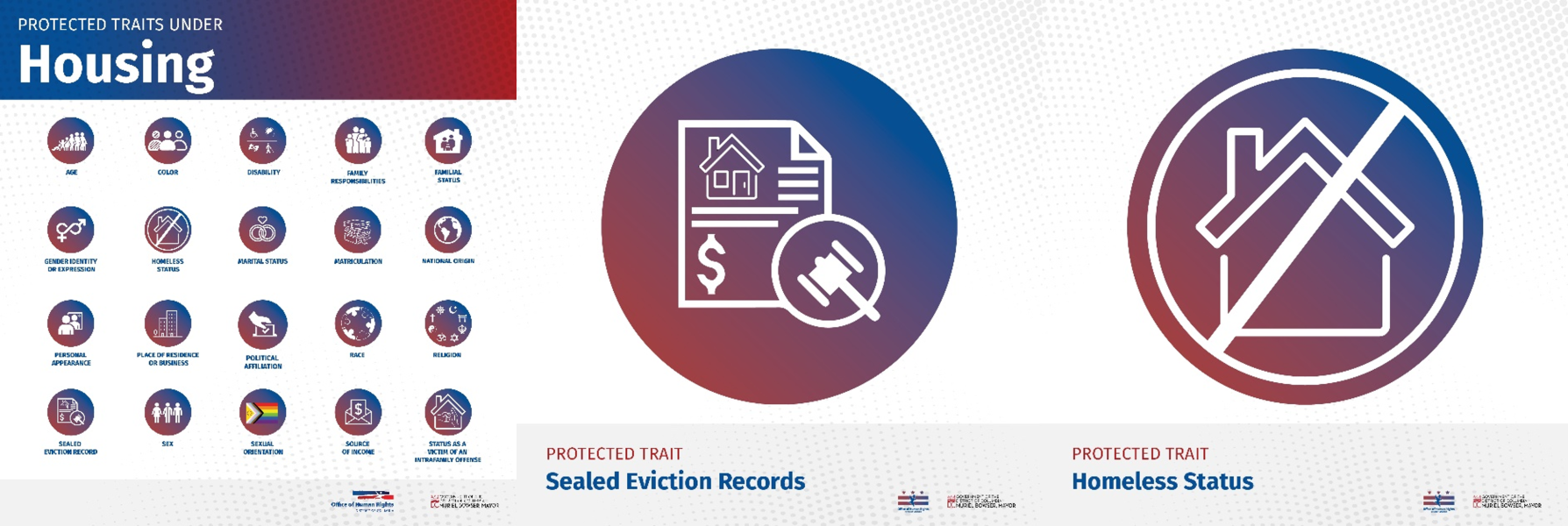
OHR's Fair Housing Resources
Sections On This Page:
- What Is Fair Housing?
- Local and Federal laws OHR Enforces
- File a Complaint of Discrimination
- Frequently Asked Questions: Do I have a Case?
- Fair Housing Outreach and Education
- Additional Resources
- Additional Questions and Comments
What Is Fair Housing?
The goal of fair housing in the District is to establish a robust framework for safe, secure, and affordable housing, ensuring residents are free from discrimination and other obstacles.The DC Office of Human Rights (OHR) plays a pivotal role in this endeavor, investigating housing discrimination complaints and conducting community outreach and education on discriminatory practices. Our ongoing enforcement process ensures that individuals can file housing complaints, citing local or federal laws enforced by OHR, at no cost. Examples of prohibited discrimination include, but are not limited to:
- Denying housing based on a protected trait (e.g., race, sexual orientation, and sex)
- Misrepresenting housing availability due to protected traits
- Declining to provide a loan due to an individual’s trait(s)
- Encouraging relocation to specific areas based on traits
Additionally, our educational and outreach initiatives enable OHR to collaborate with District government agencies and community partners, facilitating events such as listening labs, panel discussions, trainings,and more. Each year, our Fair Housing Awareness Month, held in April for Fair Housing Month, centers on topics of interest identified by the DC community throughout the year.
Local and Federal Laws OHR Enforces
OHR enforces local and federal laws in DC regarding housing. Individuals have the right to file a claim of discrimination regarding one of more the laws below. These laws have been summarized for a better understanding for the community. However, please note that these summaries are for informational and educational purposes only and not as legal advice to apply to a particular situation, as every housing discrimination complaint is unique and requires careful examination. Individuals in need of legal advice should consult an attorney.
- The DC Human Rights Act of 1977 (DCHRA)
- The DCHRA, there are 20 protected traits against discrimination under housing. These include:
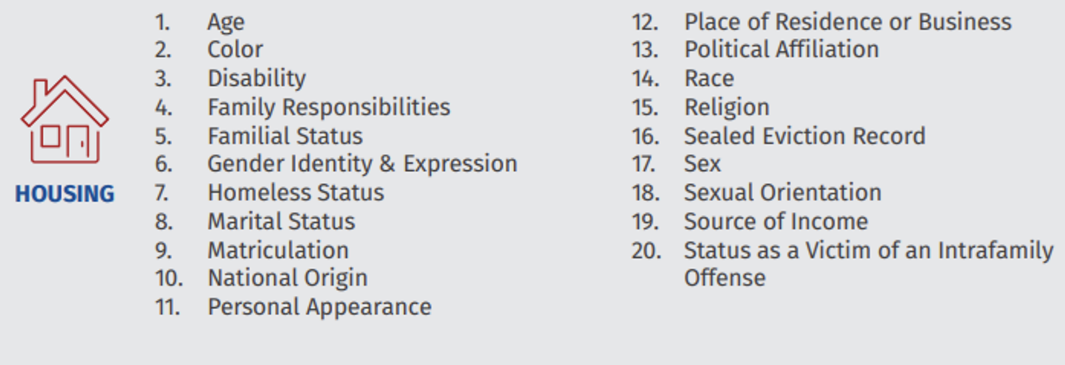
- To explore definitions and the full scope of 23 Protected Traits in the other areas of enforcement, also in additional languages, please click here
- To file a complaint, please click here.
- For more information, please visit the following:
- Fair Criminal Record Screening for Housing
- Enacted in 2017, this law supports individuals who may have faced improper inquiries about their criminal backgrounds during housing applications. It ensures transparency in the application review process by requiring housing providers to disclose eligibility criteria before accepting application fees or withdrawing conditional housing offers upon discovery of criminal convictions.
- To file a complaint, please click here.
- For more information, please visit the following:
- Rental Tenant Screening Violations
-
Parts of the Eviction Record Sealing Authority and Fairness in Renting Amendment Act of 2022, D.C. Code § 42-3505.10, also established a number of new requirements for District housing providers when they are screening potential tenants, including limiting the amount of fees a housingprovider can charge during the application process and limiting the information a housing provider may request and consider during the screening process.
- To file a complaint, please click here.
- For more information, please visit:
-
- Sealed Eviction Record Violations
- The DCHRA was amended to include the Eviction Record Sealing Authority and Fairness in Renting Amendment Act of 2022. It prohibits discrimination based on sealed eviction records in any housing transactions.
- To file a complaint, please click here.
- For more information, please visit:
- Source of Income Discrimination in Housing
- Under the DCHRA, it is unlawful to deny, directly or indirectly, any individuals the full and equal enjoyment of housing, including the rental of a dwelling, services, facilities, and privileges, based on a person’s “source of income. The Eviction Record Sealing Authority and Fairness in Renting Amendment Act of 2022 updated the protections under the DCHRA regarding source of income by adding the following:
- Prohibiting discrimination based on past credit issues or rental payment history that occurred before a prospective tenant received a housing subsidy;
- Prohibiting discrimination based on income level and credit scores unless required by federal law;
- Creating a rebuttable presumption of discrimination if a housing provider charges any fees, deposits, or additional rent on individuals using income-based housing subsidies, which they wouldn't impose on those not using such subsidies.
- To file a complaint, please click here.
- For more information, please visit the following:
- Enforcement Guidance 23-03: Updated Source of Income Discrimination in Housing - Updated Octoer 9, 2025
3. File a Complaint of Discrimination
If you believe you have experienced housing discrimination based on one or more of the laws mentioned above, you are encouraged to use the following forms. If you have any questions about how to complete these forms, please contact OHR at [email protected].
- Form for Filing a Housing Complaint Under the DC Human Rights Act
- English (Print) (Online)Anchor
- Amharic / አማርኛ (Print / ማተም)
- Chinese / 中文 (Print / 版)
- French / Français (Print / Imprimer)
- Korean / 한국인 (Print / 인쇄)
- Spanish / Español (Print / Español)
- Vietnamese / Tiếng Việt (Print / Xuất Bản)
- Fair Criminal Record Screening for Housing Complaint Form
- English (Print) (Online)
- Rental Tenant Screening Violations
- English (Print)
Frequently Asked Questions: Do I have a Case?
OHR conducts fair housing outreach and training sessions in all corners of the city, engaging with the public and addressing their questions and concerns. Below, OHR has compiled a list of FAQs to help individuals better understand fair housing laws and what constitutes a fair housing violation. While these FAQs cover common topics, they may not encompass all possible scenarios. Additionally, it is available for download in english and soon to be the top six language in DC.
If you think you have a FAQ worthy question, please reach out to [email protected]. Please note that the list below is for educational purposes only and does not constitute legal advice as it applies to a particular situation, nor does OHR provide legal advice as it pertains to a particular situation. Any person or entity in need of legal advice should consult an attorney knowledgeable in this area of the law.
FAQ 1 - Exemptions
- Are there any properties that are exempt from Fair Housing Laws?
- Yes. Property owners that sell or rent out their single-family home or that live in one unit of a 4-or-fewer-unit building, religious organizations that limit the sale, rental, or occupancy of a dwelling to persons of the same religion, and senior housing (HOPA) discriminating on the basis of familial status.
- Can owners of single-family homes discriminate in advertisements?
- No, they cannot. Owners of single-family homes cannot be discriminatory in their advertisements or statements.
- Can senior housing facilities discriminate against my race, religion or other protected traits?
- No. Although discrimination based on familial status is permissible in senior housing, discrimination based on race, religion, or other protected traits is not permissible.
FAQ 2 –Reasonable Accommodations vs Modifications
- What are the differences between reasonable accommodations or modifications?
- The main differences lie in whether the change is structural or non-structural, and who is responsible for the expense.
- A reasonable accommodation is a change to a rule, policy, practice, or service given to a person upon their request that allows them to use and enjoy their dwelling, usually at the expense of the housing provider. These can include examples like (this is not an exhaustive list):
- Creating an ADA accessible parking space
- Making exceptions to “No Pet” policies
- For more examples and information, please see Reasonable Accommodation Under the Fair Housing Act.
- A reasonable modification involves structural changes to the dwelling, facilitating full enjoyment by a person with a disability, usually at the expense of the tenant. Examples include (this is not an exhaustive list):
- Installing a ramp
- Lowering countertops
- Widening hallways or doorways
- For more examples and information, please see Reasonable Modifications Under the Fair Housing Act.
- Are there organizations that can help with the expense of a modification?
- Yes, there are several community-based organizations (CBOs) that can help with the expense of a home modification. For a list of programs, please click here.
FAQ 3 – Assistance Animals
- Is there a difference between a pet and an assistance animal?
- Yes, assistance animals are not pets. There are two types of assistance animals: (1) service animals, and (2) other animals that do work, perform tasks, provide assistance, and/or provide therapeutic emotional support for individuals with disabilities including a physical, sensory, psychiatric, intellectual, or other mental disabilities that affect major life activities (referred to as a “support animal”).
- Does my assistance animal have to be certified?
- No, assistance animals are not required to be certified or go through a professional training program. Housing providers are allowed to require only: (1) that a tenant provide a verification from a physician or other healthcare provider that the tenant meets the District’s definition of a person with a mental or physical disability; and (2) that you demonstrate a connection between the disability and the function provided by the assistance animal. As long as you get third-party verification supporting your need for a assistance animal, your housing provider should honor that request.
- Can I be denied housing because the property has a strict “No Pet” policy?
- Generally no, unless: (1) the housing provider is covered by an exemption (see FAQ 1); or (2) granting the request to permit an assistance animal would (a) present an undue financial or administrative burden to the housing provider, (b) fundamentally alter the nature of the landlord’s operations, or (c) constitute a direct threat to the health or safety of other individuals. Because assistance animals are not “pets,” but rather are assistive aids, housing providers must generally make an exception to its “no pet” policy so that a tenant with a disability can fully use and enjoy his or her dwelling. Persons with disabilities may contact their housing provider and submit a reasonable accommodation request to live with their assistance animals at no-pets properties, for a pet deposit fee waiver, or request waiver of other rules that exclude or limit the assistance animal’s function. The reasonable accommodation request may be made orally, in writing, or through a third party.
FAQ 4 – Use of Housing Vouchers
- Do all housing providers have to accept vouchers?
- Yes, unless covered by an exemption (see FAQ 1), housing providers must accept all forms of housing vouchers and may not post discriminatory advertisements indicating a preference based on a tenant’s source of income.
- What types of vouchers must housing providers accept?
- Housing providers must accept all forms of income, including any housing voucher or subsidy, which pays part of and/or the full rental amount. This includes (not an exhaustive list):
- Rapid Rehousing Vouchers
- Housing Choice Voucher Program (formally known as Section 8)
- Emergency Rental Assistance Program (ERAP)
- Housing providers must accept all forms of income, including any housing voucher or subsidy, which pays part of and/or the full rental amount. This includes (not an exhaustive list):
- Can a housing provider run my credit if I’m using a voucher?
- Yes, they can. However, a housing provider cannot deny your rental application based on credit issues or nonpayment of rent that occurred prior to when you first received your voucher.
- What if my voucher doesn’t cover the full amount of rent? Can they look at my income?
- Yes, if you pay a portion of the rent out of pocket, your income will be considered. However, a housing provider can only require that you meet the income requirement for your portion of rent. However, if your income can cover at least 30% of the rent you are responsible for, they should not deny your application solely based on insufficient income.
FAQ 5 – Discrimination vs Landlord Tenant Issues
- Is it discrimination when my landlord/leasing office is rude to me?
- It depends. Discrimination typically involves adverse actions based on protected traits. Rude behavior alone does not usually constitute discrimination unless tied to a protected trait. For example, if a landlord prevents all tenants from using the laundry facility, that would likely not be considered a discriminatory action. But if a landlord prevents only you from using the laundry facility and has made comments about your national origin in the past, that might be considered a discriminatory action.
- Is it discrimination if my landlord doesn’t provide consistent maintenance for tenants?
- It depends. If the housing provider does not make consistent repairs to the property, that doesn’t necessarily fall under discrimination. But it could be an issue that may be addressed by relevant authorities such as the DC Office of the Attorney General or the Office of the Tenant Advocate. However, if you notice that repairs are being made to some units or properties but not the others, that may be discrimination.
- Can my landlord evict me because I had to call the police multiple times due to domestic violence?
- No, they cannot. There are additional protections for people experiencing intrafamily offenses (i.e., domestic violence). You should not be evicted because you call the police, ask for additional security measures, or need locks/doors replaced due to domestic violence. Additionally, if you need to leave the property, you have the right to terminate the lease by providing 14-days written notice.
FAQ 5 – Returning Citizens and Housing
- Can I file a discrimination case if I was refused housing because of a criminal background check?
- Having a criminal record is not a protected trait under the DC Human Rights Act, so you cannot file a Fair Housing discrimination claim based on having a criminal record. However, there is a law that specifically addresses fair housing for returning citizens, the 2016 Fair Criminal Record Screening for Housing Act, commonly known as “Ban the Box.” This law requires most rental housing providers to provide notice of their rent eligibility criteria to applicants before accepting an application fee and also prohibits housing providers from requiring background checks before making a conditional offer of housing. After a conditional offer, housing providers are only allowed to consider pending criminal accusations or convictions from the last 7 years that are listed in the law. Housing providers can only withdraw a conditional offer of housing after considering factors listed by the law. Landlords that do not comply with the law may be penalized with a fine of $1,000-$5,000 depending on how many rental units the landlord has in D.C. For more information about this law and the process for filing a complaint for a violation, see OHR’s Returning Citizens and Housing.
Fair Housing Outreach and Education
- Relaunch of Fair Housing Is Your Right Campaign
- In April of 2024, to celebrate Fair Housing Month and the launch of OHR’s Fair Housing Portal, we updated and relaunched our “Fair Housing Is Your Right” Campaign. Originally created in the Summer of 2012, it aimed to educate DC residents about anti-discrimination laws in housing, in hopes of reducing discriminatory incidents and increasing reporting. The newly upgraded posters focus on highlighting the DC Human Rights Act’s 23 protected traits: sexual orientation, source of income (such as the use of housing vouchers), familial status and responsibilities (such as people with children), and homelessness.
- Fair Housing Month
- Every April, OHR actively participates in Fair Housing Month by orchestrating comprehensive social media campaigns and organizing listening labs and community outreach events. These efforts focus on addressing pertinent housing topics, such as the intersection of COVID-19 and housing issues.
- Trainings
- OHR conducts various training on housing laws, issues, and general information. All OHR presentations emphasize OHR's jurisdiction in housing matters and the protected traits under housing laws, as well as provide an overview of relevant local and federal housing legislation. Specific training sessions, such as 'Know Your Rights: The 23 Protected Traits in Washington, DC, delve deeper into the housing laws and protected traits. Our partnerships with stakeholders and government agencies facilitate enhanced understanding of these critical housing topics.
- Listening Labs
- Listening labs allow OHR to connect with community members on housing-related concerns. Listening labs typically feature an informative segment followed by a listening session, during which attendees can confidentially share their feedback and insights. The data and findings collected from listening labs help the planning of future events and the development of outreach materials, benefiting both OHR and its co-sponsoring agencies/groups.
- Social Media and Website
- OHR disseminates its vast resources and maintains an active presence on various social media platforms, including Facebook, Instagram, LinkedIn, YouTube, and Twitter/X. Initiatives like Protected Trait Tuesday campaigns aim to raise awareness about fair housing issues. Additionally, our social media content is integrated with OHR's website to provide comprehensive information and resources to the public.
- For previous outreach campaigns, please click here.
Additional Resources
- Annual Report:
-
OHR is required to annually report progress of DC Human Rights Act enforcement to the Mayor and the Council of the District of Columbia. The report includes case dockets, case closures, and benefits achieved by successful complainants. Additionally, the Director reports other annual activities of (OHR) and the Commission on Human Rights, including community outreach, education programs, compliance programs, mediation, and fair housing.
-
Additional Questions or Comments
- E-mail: [email protected]
- In-Person: 441 4th Street NW, Suite 570N, Washington, DC 20001
- Phone: (202) 727-4559
Please note that while OHR is available to answer questions to the best of our ability, any information provided should not be considered legal advice.




